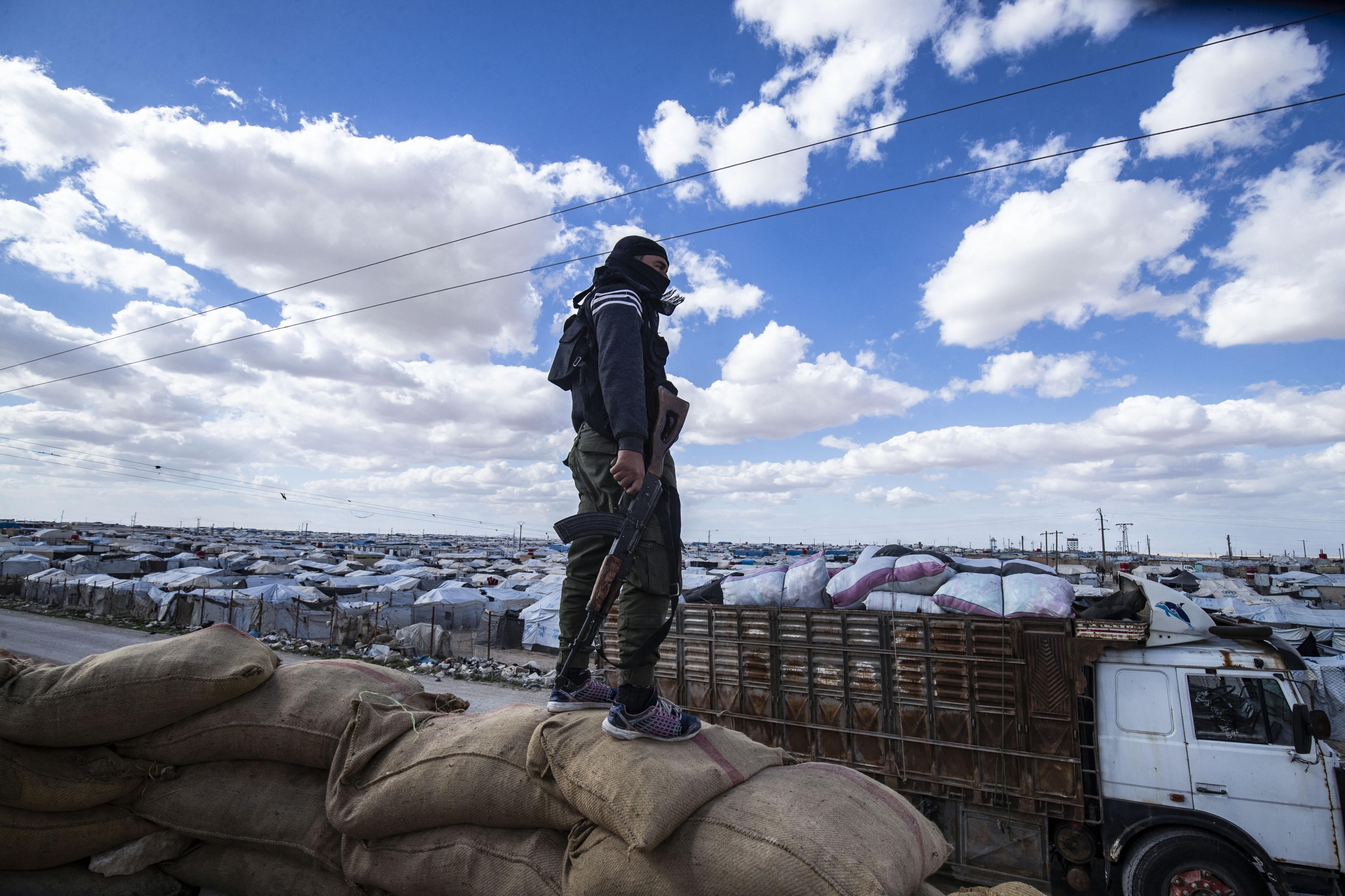Syria: Islamic State assassins stalk Al-Hol camp

When Fatima and her family the fled violent militias ruling over their hometown of Mosul, Iraq, in early 2018, they imagined they were heading away, not towards, mortal danger.
That March, Fatima, 28, her husband and two children were smuggled across the northeastern Syrian border.
They planned to make their way across Syria to Idlib, in the country’s north-west, then along one of the many smuggling routes up into Turkey.
But the family were arrested soon after crossing the border by the Syrian Democratic Forces (SDF) - a US-backed coalition of Kurdish and Arab fighters - who thought they were with the Islamic State (IS) group.
The SDF took them to Al-Hol, a camp in Syria’s northeastern Hasakeh province for suspected family members of IS militants.
"I have not seen my husband since the Syrian Democratic Forces arrested him,” Fatima, who withheld her surname for fear of reprisals from either IS or the SDF, told Middle East Eye. "I never imagined that I would end up with my two kids in a camp like a prison.
“I always object to calling this fenced desert a camp. Al-Hol is like a mini hell."
Assassination and arrest
Al-Hol, which is home to more than 63,000 people from various backgrounds, mostly women and children from Syria and Iraq, is the largest camp under the control of Kurdish authorities, who have warned that it is emerging as a breeding ground for extremism.
According to sources quoted by local media, seven Iraqi citizens and one displaced Syrian have been killed in the camp in recent weeks.
The killers shot the victims in their tents using guns fitted with silencers.
British-based advocacy group the Syrian Observatory for Human Rights (SOHR) has recorded around 40 murders in al-Hol since the start of this year.
Kurdish authorities say IS sympathisers are behind most of the assassinations, while humanitarian sources have said tribal disputes could be behind some of the killings.
AFP reported on Tuesday that 53 arrests had been made in the camp in an ongoing anti-IS operation, which SDF officials said would run for at least 10 days.
Fatima and her family left Iraq fearing the violence of the militias that took control of Mosul after the fall of IS.
But today, she says, her situation is even worse.
"We live between two bad options. ISIS cells control the camp's residents with assassinations and threats, while the Syrian Democratic Forces close the walls of this camp and prevent us from leaving without bail," she said, using an alternative name for IS.
‘You will soon meet the same fate’
In early January, a 30-year-old woman called Hind - a pseudonym to protect her identity - received death threats at the camp from men calling themselves Islamic State fighters, according to a friend of hers inside Al-Hol, who spoke to MEE on condition of anonymity.
The first messages, on WhatsApp, were threats to kill her and her 13-year-old brother Abdullah for cooperating with the SDF inside the camp and giving them information.
In a recorded call obtained by MEE, Hind can be heard denying the accusation to an IS member, who says he saw her speaking to people in the camp’s market.
'It seems that you have learned nothing from the assassination of your brother, the SDF spy. You will soon meet the same fate'
- recording of IS fighter threatening woman in Al-Hol
Hind says on the call that the SDF brought three suspected IS fighters to her, adding: "I didn't give them any names, I swear."
IS murdered Abdullah after the first threat, Hind’s friend told MEE, without giving details about when or how.
"What did Abdullah do to you?" asks Hind. "Abdullah was just a child."
"Keep going with this spying for wrongdoers and you will follow Abdullah," the IS fighter replies. "Wait and see what horror we can bring for you."
“No one dies before the day of their death," says Hind, before the recording cuts out. "Even if you send a silent pistol and all the armies of the world to kill me."
She was stabbed to death in her tent three days later.
No way out
Poverty forces many of Al-Hol’s residents to work as SDF informants in return for food, aid or money, according to Raghad al-Mahdi, a Syrian woman from Syria’s northern Raqqa region who now lives in Al-Hol with her three children.
“This in turn gets them killed by the camp's IS fighters,” Mahdi explains, “for cooperating with the SDF… ISIS cells are everywhere."
“There is no safety for myself or my children in this camp."
Raghad has no home and cannot rent a house. Her only option, she says, is to live in a tent in Al-Hol. She sells vegetables in the camp to earn money to feed her family.
Meanwhile, Fatima still hasn’t tracked down her husband.
“Getting out of the camp requires a lot of money, and also a tribal mediation from the area,” she told MEE.
“We don't have either of these two options, so we're forced to continue living in this hell.”
This article is available in French on Middle East Eye French edition.
Middle East Eye delivers independent and unrivalled coverage and analysis of the Middle East, North Africa and beyond. To learn more about republishing this content and the associated fees, please fill out this form. More about MEE can be found here.





